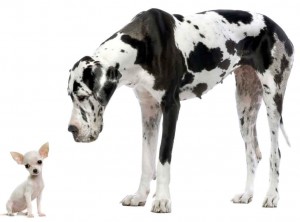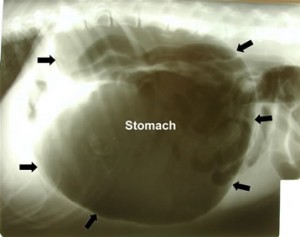GDV stands for gastric dilation volvulus and means that a dog’s stomach has been distended (bloated) with air and has twisted on itself. This is a very serious disease which occurs very suddenly, most commonly in large breed dogs, rarely in mid-small breed dogs. Before the stomach twists the disease is known as gastric dilation or bloat.
The cause of GDV is unknown but there are known risk factors:
- Deep chested dogs, especially Great Danes, German Shepherds, Weimaraners and Dobermans
- Diet – large volumes of food per meal, and meals of only dry food (biscuits)
- Underlying gastrointestinal disease
- Exercise before and after meals
- Elevated feeding (feeding from a height)
- Rapid eating
- Male gender
- Increasing age
- Poor body condition
- Stress and anxiety
- Having a first degree relative with a history of GDV
GDV is a medical emergency, it causes severe pain and distress and can result in fatal physiological disturbances, such as shock and cardiac arrhythmias.
Clinical signs (symptoms) of GDV include:
- Bloated abdomen
- Unproductive retching
- Restlessness and distress
- Collapse
- Excessive salivation or drooling
When you arrive at the vet we will:
- Administer pain relief and large volumes of IV fluids
- Take an x-ray to differentiate from bloat and GDV
- Attempt stomach decompression via a tube or needle prior to surgery
- Perform surgery if confirmed as GDV
- Provide critical care and intensive monitoring for 12-24 hours post-surgery as required
Reducing risk factors where possible is the best way to prevent GDV in at risk breeds. This can be achieved by:
- Feeding several smaller meals a day rather than one large one
- Feeding a high quality food that requires less bulk to achieve nutritional requirements
- Mixing dry food with fresh meat or tinned food
- Reducing stress and excitement during feeding times, for example separating dogs at meal times
- Not breeding from dogs with a history of GDV
- Not exercising dogs before or after meals
If you suspect your dog has GDV you must bring them into the clinic immediately.
- You have directions to our clinic and our phone number (link to find us and contact us)
- If possible call us on the way so we can be expecting you
- You drive safely!


